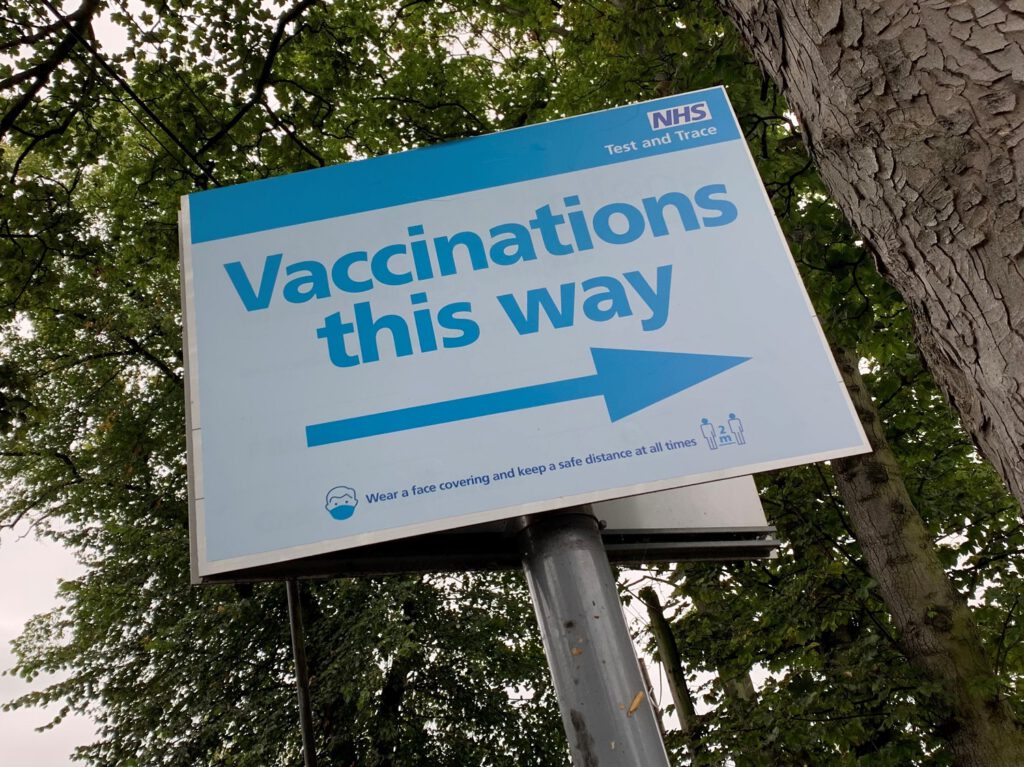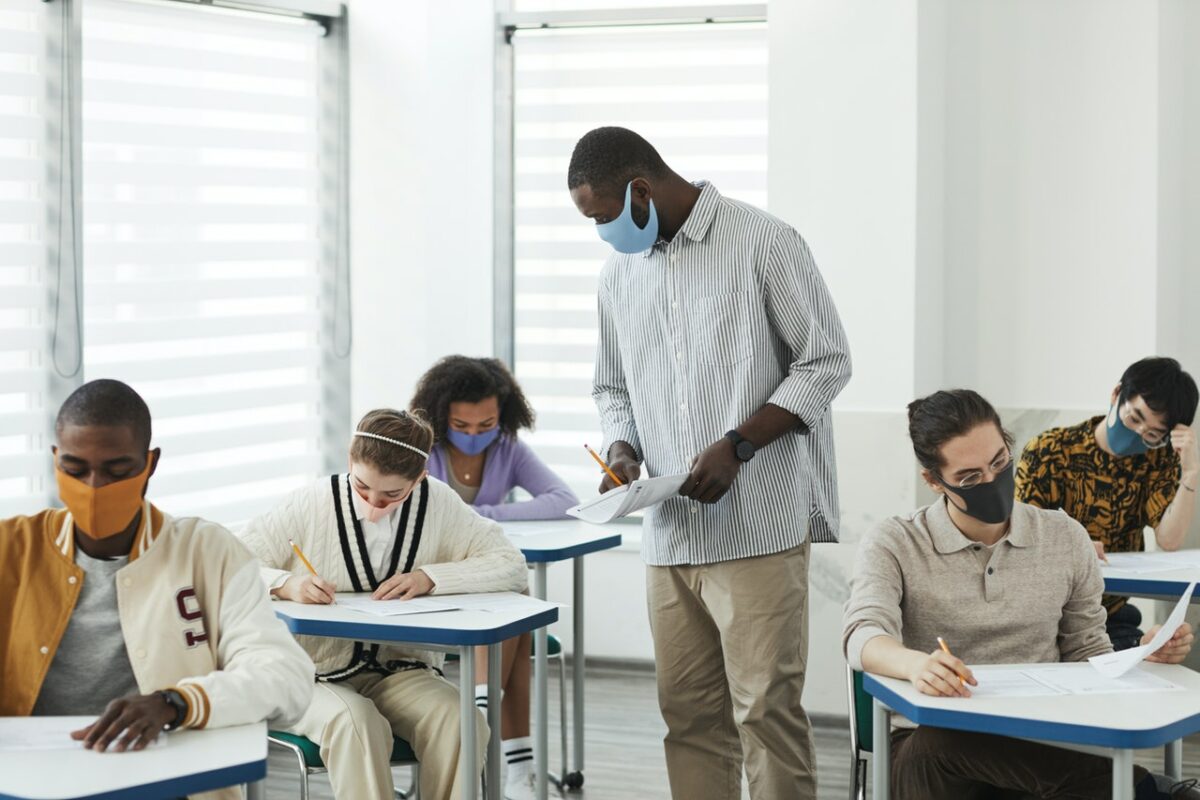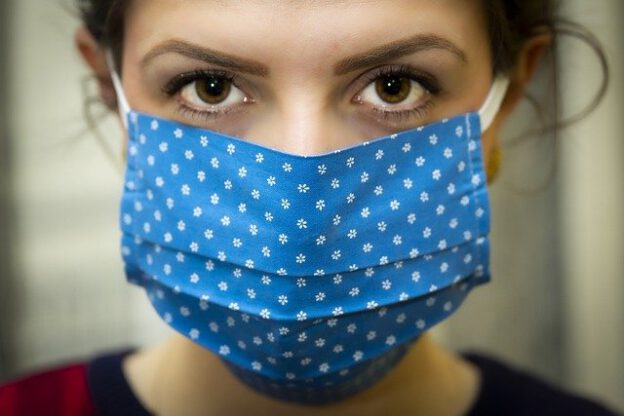More support for schools and students as plan B comes to an end – sector response

New multi-million-pound funding from NHS England will enable all schools to fully support the in-school vaccination programme, and air cleaning units will be provided in all classrooms and teaching spaces that need them, the Education Secretary has announced today, Monday 24 January.
- £8 million from NHS England to support secondary schools with the in-school vaccination programme
- New government commitment to fulfil all valid applications for air cleaning units for classrooms and teaching spaces
- Up to 9,000 units to be delivered to 1,265 education settings
The Department for Education is to distribute a total of £8 million in funding from NHS England to support secondary schools with the vitally important in-school vaccination programme for young people – hosting NHS vaccination teams and passing on materials about vaccination to further boost protection.
This comes as over 50% of 12-15-year-olds – over 1.5 million people – have now had at least one dose of the vaccine.
The government is also committing to deliver up to 9,000 air cleaning units to early years, schools and colleges across the country to improve ventilation in classrooms – up to 1,000 more than originally promised.
Since the government launched its application process, 1,265 education settings have made valid applications to receive an air cleaning unit. The further commitment will ensure every setting will receive the units they need.
The units will help in classrooms and teaching spaces where quick fixes to ventilation are not possible, such as being able to open a window.
Sector response

Education Secretary Nadhim Zahawi said:
“Face-to-face education for all students has consistently been my priority, and that is why I am pleased to further strengthen the tools available to schools to manage transmission of the virus, including funding air cleaning units for the small number of classrooms that need them due to poor ventilation, and providing additional NHS funding to free up staff time to engage with the vaccination programme for young people.
“My message remains the same as ever – testing, ventilation and vaccinations are our best weapons against the virus – keep testing, and get your vaccination as soon as possible.”

Health and Social Care Secretary Sajid Javid said:
“Keeping children in school with face-to-face teaching is absolutely essential for their education, health and wellbeing.
“Vaccines are the best way to protect students from COVID-19 and, combined with better ventilation, will help keep cases down and schools open.
“Young people can get their vaccines at school, through walk-in sites across the country or their parents can book an appointment online – please do not delay.”
NHS vaccination lead for 12-to- 15s Nick Hulme said:
“The additional £8 million in investment from the NHS will aim to further support schools to roll out the vaccine.
“It is vitally important that families get their young ones protected – either in school, through an appointment booked online at a vaccine centre or at one of hundreds of walk-in sites.”
The number of valid applications for an air cleaning unit is in line with expectations, mirroring the findings of a survey of education settings also published today, which found that only three per cent of settings using carbon dioxide monitors reported sustained high carbon dioxide readings that couldn’t otherwise be addressed.
The survey published today on schools’ use of carbon dioxide monitors also showed that of the vast majority of settings that are using the CO2 monitors, 95% were able to use them to manage ventilation in their classrooms and teaching spaces.
Special schools and Alternative Provision have already received the air cleaning units they applied for, while all other settings with valid applications will receive them as planned from the start of February.
Further information will be provided to schools shortly with further details on how the NHS funding for vaccination support will be distributed.
The funding for schools to continue to support the vaccine programme will provide secondary schools, special schools and alternative provision with a one-off payment of £1,000 with an additional uplift based on pupil numbers.
These measures – enhanced ventilation, vaccines, as well as regular testing – remain crucial to keeping young people in classrooms, learning face-to-face.
Easing of Plan B restrictions: Students will no longer be required to wear face masks in classrooms

Commenting on the latest announcement from Prime minister Boris Johnson in the House of Commons, on the easing of Plan B COVID restrictions in England, including that students will no longer be required to wear face masks in classrooms from Thursday 20 January,

Geoff Barton, General Secretary of the Association of School and College Leaders, said:
“The Prime Minister’s decision to announce that students will no longer be required to wear face masks in classrooms will be welcomed, if it is supported by sound public health and scientific advice.
“However, the situation in schools and colleges remains extremely challenging with significant levels of pupil and staff absence because of Covid-19 as well as difficulties in obtaining supply cover because of high demand.
“We continue to be very concerned about the ongoing disruption to education and the lack of sufficient support from the government for testing, ventilation, and the costs of supply cover. This really does need to be addressed.
“There is a danger that we are heading once again for a situation in which the government gives the impression that the crisis is over when in actual fact there is huge disruption continuing to take place in education and it is very far from being a case of business as normal.”

Dr Mary Bousted, Joint General Secretary of the National Education Union, said,
“Schools and colleges are still feeling the impact of COVID. The latest ONS infection survey update shows 1 in 10 primary age pupils have COVID. While the trend amongst secondary aged children is down it is however uncertain, due to the short time schools have been back since the Christmas holidays, that this trend will continue. Such uncertainty could lead to a pronounced risk of increased disruption with children and staff having to isolate.
‘We are concerned to see what the Covid related absence is when figures are released next week. The danger is we lift restrictions too quickly before the effects of returning to school are clear. This will result in more education disruption which is extremely worrying particularly for pupils taking national exams this year whose education has been so badly disrupted already.
‘Rather than announcements aimed at saving Boris Johnson’s job, Government should be exercising a duty of care to the nation’s pupils and the staff who educate them. This disruption is at the door of the Government who should have got ventilation and filtration solutions in place before Omicron as advised by SAGE and they should be getting these solutions in place urgently now to ensure interruption of education remains at the minimum.”

Paul Whiteman, general secretary for school leaders’ union, NAHT said:
“The Prime Minister’s statement about lifting plan B measures will feel, to many school leaders, at odds with the current situation on the ground. Mass disruption is ongoing, with high numbers of staff and pupils absent. School leaders are telling us they still feel very much in the eye of the Covid storm.
“The reality for many children and young people is that Covid continues to seriously disrupt the normal rhythm of schools. Parents and teachers alike will be hopeful that we have passed the peak of infections from Omicron, but it is imperative that schools continue to be supported by government to keep the gates open, as we emerge from the depths of winter disruption.”
Commenting on the Prime Minister’s announcement that all Plan B restrictions will be lifted from next week,

TUC General Secretary Frances O’Grady said:
“We need a safe return to workplaces.
“Employers must consult with staff and unions on working arrangements – including flexible working options.
“And bosses must carry out proper risk assessments and improve ventilation.”
On the decision to end compulsory face coverings in shops and on public transport, Frances added:
“Face coverings have been proven to reduce the spread of Covid.
“Making them optional on public transport and in shops at this stage in the pandemic is premature and will put workers at risk.”
On the failure to take action on sick pay, Frances added:
“Ministers must fix our broken sick pay system once and for all.
“The government is asking people to return to their workplaces but is offering them little or no financial support if they become ill.
“Sick pay must be raised to at least the rate of the real Living Wage and available to all.”
New Omicron Plan B measures: Face coverings in class, 7000 air cleaning units and reduced Ofsted visits

2nd Jan 2022: Face-to-face education remains a top priority, as the evidence shows it is the best place to be for children’s education and wellbeing.
To maximise the number of children in school and college for the maximum amount of time, the Government is temporarily recommending that face coverings are worn in classrooms and teaching spaces for students in year 7 or above, in light of the Omicron variant surge.
The advice is short term only to support pupils and teachers as they return to schools this term and builds on the existing proportionate guidance that recommends face coverings for all adults in communal areas of all settings.
The advice on face coverings in classrooms will be in place until the 26 January, when Plan B regulations are currently scheduled to expire, at which point it will be reviewed.

Education Secretary Nadhim Zahawi said:
“Being in the classroom is undoubtedly the very best place for children and I’m looking forward to welcoming pupils back next week to continue their face-to-face learning, which is so important for their education and wellbeing.
“There is no doubt that the Omicron variant presents challenges but the entire education sector has responded with a Herculean effort, and for that I thank each and every one of you.
“The Prime Minister and I have been clear that education is our number one priority. These measures will bolster our support schools as we do everything in our power to minimise disruption.”
Commenting on the government’s decision to recommend that face coverings are worn in classrooms for students in year 7 and above in light of the Omicron variant surge,

Geoff Barton, General Secretary of the Association of School and College Leaders, said:
“While there are obvious drawbacks to the use of face coverings in classrooms, it is clear that the Omicron variant poses a very significant additional risk to education with the potential for further widespread disruption of schools, colleges, and young people. It is absolutely essential that everything possible is done to reduce transmission and ensure that children remain in school, and we therefore support the reintroduction of face coverings in classrooms for students in year 7 and above.
“Face coverings are already advised in communal areas for pupils in year 7 and above. Pupils are accustomed to their use and we are sure the reintroduction of face coverings in classrooms is something that schools and colleges will take in their stride.”

Paul Whiteman, general secretary of school leaders’ union NAHT, said:
“School leaders are clear that the best place for children to learn is in school.
“We need to do everything possible to ensure face-to-face teaching continues, despite increasing infection rates due to the new variant.
“Reintroducing face masks in secondary classrooms appears to be a sensible move, given the circumstances.”

Dr Mary Bousted, Joint General Secretary of the National Education Union, said:
“Finally, the government have been forced to recognise, and react to, the scale of the Omicron variant and its potential impact on education.
“The recommendation on wearing facemasks in secondary school classrooms is overdue – but it should be a requirement.
“Seven thousand more air purifiers is something, but it is completely inadequate for what should be a basic human right, the provision of clean air in every classroom in every educational setting. The fact that the government have provided the extra purifiers shows that it recognises the problem but with over 300,000 classrooms in England they have failed to provide an effective solution.
“It is hard to see how Ofsted will function without the services of serving head teachers. Rather than limping along, Ofsted should suspend all inspections other than safeguarding concerns. Given the current, sky-high rates of infection, every school will be significantly affected by Covid. The focus should be on the essential aim of providing education continuity for as many pupils as possible, not on jumping through Ofsted hoops.”

Extra Covid measures should have been introduced weeks ago, says UNISON assistant general secretary Jon Richards said:
“An increase in the use of face coverings and better ventilation are welcome but should have been in place before Christmas to have slowed the infection in schools.
“Providing 7,000 filters is a helpful step. But with over 20,000 schools – many with dozens of classrooms – this will barely scratch the surface.
“These new measures also don’t address the need for extra funding to meet additional costs to schools and colleges, such as paying for agency cover when staff are sick or isolating.
“Nor do they tackle the additional workload for those who’re able to work, or ensure staff working for private contractors are given full sick pay when they need to isolate.
“Unions have been calling for these changes for months. But just like last year, changes announced at the last minute leave little time to prepare for the new term.”

Paul Whiteman, general secretary of school leaders’ union NAHT, said:
“School leaders are preparing for the return to school this week and are taking the additional measures announced over the weekend in their stride, arranging testing and informing parents and carers about the new mask rules. They are hoping the extra measures will be enough to minimise disruption to education this term, but only the next few weeks will show how effective they really are.
“The biggest concern is staffing. Teachers and school staff will be testing and reporting their results at the start of this week and only then will school leaders know who they have available and be able to properly plan. School leaders will be doing everything possible to ensure a smooth return and a successful term for their students, but depending on how infection rates progress, it could be another stressful time.”
Temporary Ofsted measures introduced to support the safe return of pupils to school and minimise disruption
Ofsted is encouraging early years settings, schools and colleges that are significantly impacted by COVID-related staff absence to ask for their inspection to be deferred.
Additional support for school leaders will also be in place, as Ofsted will not ask inspectors who are also school, college and early years leaders to undertake inspections, so they can focus on their leadership responsibilities at this critical time. This will be a temporary measure from the start of January.
Ofsted has already confirmed that it will not be inspecting secondary schools during the first week of term in January, as schools undertake on-site pupil testing.

Geoff Barton, General Secretary of the Association of School and College Leaders, said:
“We also welcome the fact that Ofsted will encourage education settings that are significantly impacted by Covid-related staff absence to ask for their inspection to be deferred.
“Once again, we have been asking for some time for inspection deferrals to be granted upon request from the school or college concerned because of the severe level of disruption that many are experiencing and the importance of being able to focus on education rather than inspections. We’ll be looking closely at how the process announced today will work.”

Paul Whiteman, general secretary of school leaders’ union NAHT, said:
“Ofsted inspections are the very last thing schools need given the pressure they are under just to stay open and minimise disruption for learners. Pupils will be best served by their schools not being distracted by preparation for inspection.
“Encouraging schools to ask for deferrals of inspections is helpful but it would be even better if all uncertainty were removed by simply suspending inspections entirely this term so inspectors can return to the classroom, to help the effort.”

Dr Mary Bousted, Joint General Secretary of the National Education Union, said:
“It is hard to see how Ofsted will function without the services of serving head teachers. Rather than limping along, Ofsted should suspend all inspections other than safeguarding concerns.
“Given the current, sky-high rates of infection, every school will be significantly affected by Covid.
“The focus should be on the essential aim of providing education continuity for as many pupils as possible, not on jumping through Ofsted hoops.”
More support to keep pupils in the classroom includes a further 7,000 air cleaning units to be rolled out to classrooms across the country
Thousands of new air filters and further temporary measures will be introduced to protect face-to-face education and minimise disruption, ahead of the pupils returning to the classroom this week.
Education Secretary Nadhim Zahawi has announced an additional 7,000 air cleaning units to be provided to early years, schools and colleges to improve ventilation in teaching spaces – further helping to strike the balance between managing transmission risk along with reducing disruption to in-person learning.
The 7,000 new air purifiers will be for areas where quick fixes to improve ventilation are not possible, such as being able to open a window, and will help to improve ventilation in schools. This builds on the 1,000 air purifiers announced for special schools and alternative provision settings.
Feedback from schools suggests that the 350,000 carbon dioxide monitors rolled out across the country are also acting as a helpful tool to manage ventilation.

Geoff Barton, General Secretary of the Association of School and College Leaders, said:
“We welcome the provision of an additional 7,000 air cleaning units for early years, schools and colleges to improve ventilation. We have been calling for this for some time and it should have been done earlier but it is a case of better late than never. We await further details about the eligibility criteria for these devices and we urge the government to make sure this scheme is as accessible as possible.
“All of this is a recognition by the government that the spring term will be extremely challenging for schools and colleges. The biggest problem they face is the likelihood of high levels of staff absence caused by the prevalence of the Omicron variant. While schools and colleges will do their very best to minimise the impact on pupils, as they always do, there is a possibility that this will mean that some classes and year groups have to be sent home for short periods of time to learn remotely.”

Paul Whiteman, general secretary of school leaders’ union NAHT, said:
“Where schools need air filtration units to improve areas of poor ventilation, they should be provided with them, without delay. The announcement, therefore, that 7000 more units will be made available is welcome.
“We will encourage government to monitor demand and to make more available as required, to ensure all schools that need one, get one. Adequate ventilation in classrooms should not be limited to first come, first served.”

Dr Mary Bousted, Joint General Secretary of the National Education Union, said:
“Seven thousand more air purifiers is something, but it is completely inadequate for what should be a basic human right, the provision of clean air in every classroom in every educational setting.
“The fact that the government have provided the extra purifiers shows that it recognises the problem but with over 300,000 classrooms in England they have failed to provide an effective solution.”
Omicron Plan B measures: How will new Covid measures impact schools, colleges and universities?

8th Dec 2021: The Prime Minister has announced the implementation of Plan B of the COVID-19 Response: Autumn and Winter Plan, as a result of increasing pressure on the NHS.
DfE have already increased safety measures across education settings and set these measures out on 28 November.
Here DfE provide further details on what Plan B means for education settings:
Will schools be closing early?
No, schools will not be closing early and our updated guidance ensures face-to-face education continues. School attendance remains mandatory.
Will pupils and students have to wear face coverings or masks?
Our latest guidance does not change the advice on face coverings.
We have already advised that staff, visitors and pupils or students in year 7 and above should wear a face covering in communal areas. This includes FE and HE settings. We do not recommend that pupils and staff wear face coverings in classrooms, unless their Director of Public Health advises them to temporarily do so in one of the circumstances described in the Contingency Framework Guidance.
In early years settings and primary schools, we already recommend that face coverings should be worn by staff and adults (including visitors) when moving around in corridors and communal areas.
Can Nativities and Christmas events still go ahead?
Yes. Nativities and Christmas events can continue to go ahead.
Do parents and other people attending events need to test?
Schools, colleges early years settings and universities should continue to encourage those attending events to test beforehand and use face coverings and to ensure those events are held in well ventilated spaces.
What are the rules on testing?
Testing should take place regardless of symptoms – this is called asymptomatic testing and helps stop people with the virus but who don’t have symptoms spreading it inadvertently.
Staff in all education and childcare settings and students, of secondary school age and above should continue to test twice weekly at home with lateral flow device (LFD) test kits, 3-4 days apart, for the remainder of the autumn term and on return in the spring term.
Staff and students who are continuing to attend education/childcare settings over the Christmas period should continue to be encouraged to test at-home twice weekly.
Staff and students who are not attending their setting during the holiday period may wish to take a rapid lateral flow test in situations where they are more likely to catch or spread COVID-19. This includes spending time in crowded and enclosed spaces, or before visiting people who are at higher risk of severe illness if they catch COVID-19.
Schools and colleges are strongly encouraged to ask parents and other visitors to take a lateral flow device (LFD) test before visiting the school.
8th December 2021: Prime Minister Boris Johnson announces the Government Plan B measures are coming into place to combat the rising Covid rates due to the new Omicron Covid-19 variant. At the time of the announcement there were 568 Omicron confirmed cases in the UK, but as the Prime Minister explains that the true number will be much higher.
The Omicron cases are doubling every two or three days and mirrors the cases seen in South Africa, who had a 300% increase in hospitalisation within the last week. The Prime Minister, Boris Johnson said in the media briefing after his main announcement, that children should stay in schools and nativities (plays) should still go ahead.
The Government Plan B measures include the guidance to work from home when you can from Monday 13th December 2021, from Friday 10th December 2021 there will be a legal requirement to wear masks / fast coverings in indoor venues, with Covid passports mandatory in unseated outdoor venues of over 4,000 people and any venue of over 10,000 people or a negative lateral flow test result.
Sector Reaction to the Plan B Omicron Measures:

Tom Bewick, Chief Executive of the Federation of Awarding Bodies (FAB) comments:
“The move to Plan B will not have a major impact on the awarding and assessment sector as the government has fully committed to educational settings for all learners remaining open.
“Likewise, Ofqual has well drilled contingency plans in place should adaptations need to continue. That said, we must not allow these additional restrictions to stay in place for a day longer than is necessary. For example, as a result of previous restrictions we know how damaging this was to broader student welfare and learning, including over 100,000 school children go missing off the register.
“I would encourage the government to move quicker to establish beyond doubt whether omicron really is a variant to be concerned about, in terms of causing more hospitalisations and deaths in the population, or whether in fact we are now entering the more endemic phase of the crisis, where it is more about effective management of the disease, not the draconian restrictions of the type we have seen in the past 20 months.”

Jane Hickie, Chief Executive of the Association of Employment and Learning Providers (AELP) said:
“While no one is going to celebrate further restrictions, it is right that we all play our part in keeping each other safe, in light of the ongoing Covid-19 situation. I particularly urge all FE providers to continue keeping learners and staff safe by following government guidance. We will keep engaging with DfE on issues pertinent to work-based learning, as we have throughout the pandemic”.

Commenting on today’s press briefing in which the Prime Minister announced ‘Plan B’ measures, Kevin Courtney, Joint General Secretary of the National Education Union, said:
“We are disappointed that in his announcement the Prime Minister has made no mention of schools, given that cases are rising so fast and this is leading to so much disruption of education. More than 200,000 pupils were absent for Covid-related reasons on 25 November and since then infection rates among school-age children have risen further.
“It is clear that current mitigations are not enough to keep at bay rising case counts, especially in the new context of the fast-spreading Omicron variant. The National Education Union put out its own Plan B for schools earlier today, and we think Boris Johnson must act now to minimise the disruption of education.
“We have called for the following mitigations:
- – Face coverings to be worn, in line with Government requirements, by pupils and staff in secondary communal areas and by primary staff in communal areas. This should be extended to secondary classrooms for staff and students. No member of staff in any setting should be prevented from wearing a face covering in any part of the premises;
- – Children who have a sibling or other household member with covid-19 should not attend school/college until they have had a negative PCR test – as in Scotland – in addition to the Government guidance of 10-day isolation on close contacts of confirmed or suspected Omicron cases.
- – The Government should change its ventilation guidance to state that classrooms must keep CO2 below 800 ppm, as advocated by the HSE and should invest urgently in air-filtration devices.
- – Measures such as one-way routes and staggered break times should be urgently reintroduced to minimise mixing between classes and year groups wherever possible.
- – Government to issue guidance to all schools and colleges on safe organisation of gatherings and meetings, including options for social distancing or virtual events, based on factors including local case rates, outbreaks in the school/college itself, quality of ventilation and space available.
- – In addition, Government should encourage schools and colleges to allow staff to book vaccines and boosters during working hours without loss of pay and launch a campaign to encourage twice weekly testing for all staff and pupils. Government should also mandate provision of higher-grade medical masks (FFP2, FFP3) provided where requested by at-risk staff and pupils previously defined as clinically vulnerable, or clinically extremely vulnerable, or involved in close contact and personal care.
“The Prime Minister must act. We need a plan B for schools and colleges now.”
TUC: reboot furlough to save jobs in sectors hit by Plan B
The TUC has called for Treasury support to protect jobs, and for the sick pay system to be fixed to reduce spread of Omicron, in response to today’s announcement of ‘plan B’ restrictions.
The union body highlights that when a work from home instruction was last in place in June 2021, nearly two million jobs were protected by furlough, including nearly half of the jobs in hospitality that were eligible for the scheme.

TUC General Secretary Frances O’Grady said:
“Requiring people to work from home over the busy Christmas period will hit jobs – unless ministers bring back furlough. Cleaners, receptionists, conference and banqueting staff and hospitality and retail workers will be short of work if people don’t come into offices.
“Ministers must reassure workers in hard-hit sectors like hospitality, leisure and travel that their livelihoods are secure.
“Furlough was the great success in the first response to the pandemic. The rise of the Omicron variant shows why the UK needs a permanent short-time working scheme – ready to go when a new crisis hits.
“If we’re serious about stopping Omicron, ministers must fix our broken sick pay system, so every worker gets a decent amount to live off if they are sick or have to self-isolate. That’s how we make sure people can follow the rules and stop the spread.”

Commenting on the announcement by the Prime Minister that ‘Plan B’ measures are to be introduced in England in response to the Omicron variant, Dr Patrick Roach, General Secretary of the NASUWT-The Teachers’ Union, said:
“Given the Prime Minister’s acknowledgement that the Omicron variant may be significantly more transmissible, it would be appropriate to extend further control measures in schools and colleges.
“Further measures including extending the use of face coverings in classrooms, an immediate and extended programme of onsite Covid testing of pupils, and robust rules and support for close contacts to self-isolate would have a significant impact on helping to break the chain of Covid transmission and minimise further disruption to pupils’ education.”
What do the new temporary COVID-19 measures mean for schools, colleges and universities?
Omicron: New temporary COVID-19 measures for schools, colleges and universities
28th Nov 2021: In response to the Omicron variant of Covid-19, the Department for Education has today (28 Nov) advised schools and colleges that face coverings should be worn in communal areas in all settings by staff, visitors and pupils or students in year 7 and above. Any suspected or confirmed close contacts of the Omicron variant will be asked to isolate for 10 days regardless of vaccination status or age.
Most of the guidance hasn’t changed and the new measures that are being introduced are temporary and precautionary and will be reviewed in three weeks. DfE will continue to keep this under review as the situation develops.

Education Secretary Nadhim Zahawi said:
“The news of a new variant – the so-called Omicron variant – will have understandably caused concern for people across our country, including our teachers, wider education and childcare staff, parents, pupils and students.
“We are already taking targeted and proportionate action as a precaution while we find out more information about the new variant. As we do so, we will continue to prioritise children’s and young people’s education and wellbeing, making sure education and childcare settings are as safe as possible and children continue to benefit from classroom teaching.
“We are working with education and childcare settings to enhance safety measures where needed, including introducing isolation for 10 days for close contacts of suspected Omicron cases.
“I’d like to thank everyone working to support our children and young people for their patience and hard work.”

Geoff Barton, General Secretary of the Association of School and College Leaders, said:
“We support these measures as a sensible response to the risks posed by the Omicron variant of Covid-19.
“This worrying situation, however, emphasises the need for better support from the government for the education sector.
“The government has already asked secondary schools to provide on-site Covid-19 testing for pupils at the beginning of next term. This is a huge additional responsibility, and the government should be giving schools much more support. The organisation and staffing of testing stations should be the remit of public health teams. The government should also give more advance notice of on-site testing if this is required again in future.
“Ministers must also commit to providing all schools and colleges with government-funded air cleaning units as needed, instead of the current approach of advising most settings that they will need to purchase this equipment in an ‘online marketplace’.
“It appears that the Omicron variant may result in more staff and pupil absence thereby worsening an already very grave situation.
“It is therefore imperative that the government provides workforce funding to schools and colleges to help with the cost of supply cover for absent staff. Schools and colleges are in a position of having to provide in-class teaching for some groups of students, and remote education for other groups of students, at the same time as experiencing Covid-related staff absence. They simply cannot sustain the ongoing costs of the supply cover that is required.
“The government must also promote a public campaign to encourage twice-weekly home Covid testing among eligible pupils in order to reduce the risk of transmission.
“We have made these calls on many occasions. It is clear that this crisis is not going away, and we once again call upon the government to give the sector the backing that it needs.”

Paul Whiteman, general secretary of school leaders’ union NAHT, said:
“This is a worrying time for schools. As always, the safety and wellbeing of pupils, staff and families is the number one priority. Given the level of uncertainty about the new variant, we are pleased the government is taking a precautionary approach.
“It only makes sense for the requirements for face masks in schools to match the rules for the wider population. It’s good that the government has moved swiftly to give clarity to schools and parents about the new mitigations.”
Commenting earlier today, on the news of a new Covid-19 variant and the government’s reintroduction of safety mitigations for the general public, Paul Whiteman, had said:
“In light of the new national measures announced yesterday, we fully expect the DfE and local public health teams to be issuing updated guidance to schools as a matter of urgency. It is essential schools know where they stand in terms of key issues such as face masks and new isolation rules.
“The pressure on schools is unrelenting. Any uncertainty will add to that sense of continuing jeopardy. The government needs to get advice out to schools fast. Where interventions differ from the wider community that needs to be explained. And where interventions require even more effort that needs to be properly resourced.
“Given the level of uncertainty about the new variant, we would expect government to be taking a precautionary approach when it comes to schools, at least until we have more information. As always, the safety and well-being of pupils, staff and families will remain schools’ number one priority.
“Parents should be aware that school leaders have no more information than the general public at this stage.”
DfE outline what the new measures mean for education and childcare settings and what’s changed:
Face coverings
From tomorrow, we are strongly advising that face coverings should be worn in communal areas in all settings by staff, visitors and pupils or students in year 7 and above, unless they are exempt.
Pupils or students (in year 7 or above) should continue to wear face coverings on public and dedicated school transport, unless they are exempt.
Testing
All educational and childcare settings should continue to encourage staff and students to twice weekly using lateral flow device (LFD) tests.
Contact tracing and isolation
The current guidance on contact tracing and isolation remains in place – which means that close contacts should take PCR tests but do not need to isolate unless they are over 18 and unvaccinated. The exception is for close contacts of suspected or confirmed Omicron cases, who will be asked to isolate for 10 days.
Vaccination
All eligible staff and students aged 12 and over are encouraged to take up the offer of the vaccine, including boosters.
Vaccines are our best defence against COVID-19. They help protect young people and adults, and benefit those around them. Vaccination makes people less likely to catch the virus and less likely to pass it on.
To book a vaccine, please visit: Book or manage a coronavirus (COVID-19) vaccination – NHS (www.nhs.uk).
International visits and trips
Individuals arriving in England must follow the red list rules.
South Africa, Botswana, Eswatini, Lesotho, Namibia and Zimbabwe moved onto the red list at 12.00pmFriday 26 November.
Angola, Malawi, Mozambique and Zambia were added to the red list at 4am Sunday 28 November..
Schools, out of school settings and colleges will want to consider whether to go ahead with planned international educational visits at this time, recognising the risk of disruption to education resulting from the need to isolate and test on arrival back into the UK.
Good hygiene
Across all settings, people should continue to follow the basic rules of good hygiene. This will help to protect individuals and others from COVID-19. These are:
- washing your hands
- cleaning your surroundings
- covering your nose and mouth when you cough and sneeze
On Saturday 27 November, the Prime Minister announced new temporary measures to “buy more time” for our scientists to understand the situation.












Responses